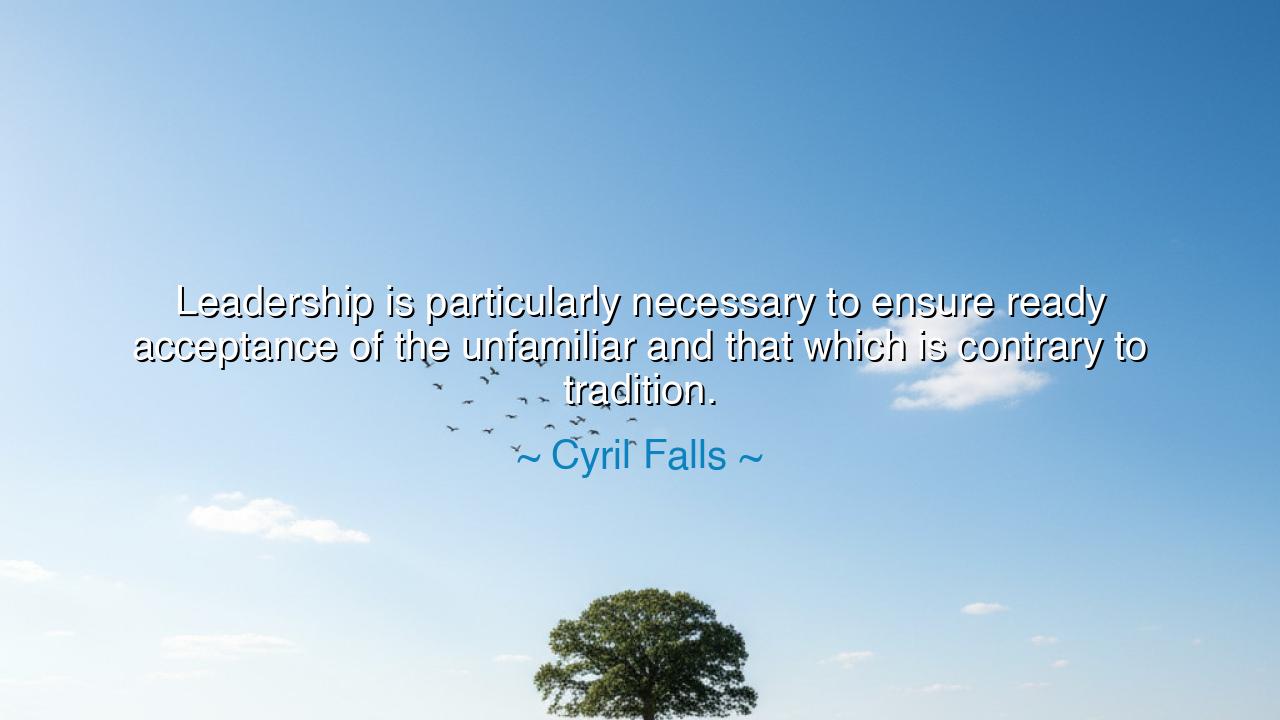
Leadership is particularly necessary to ensure ready acceptance
Leadership is particularly necessary to ensure ready acceptance of the unfamiliar and that which is contrary to tradition.






“Leadership is particularly necessary to ensure ready acceptance of the unfamiliar and that which is contrary to tradition.” — Cyril Falls
Hear these words, O seeker of wisdom and guardian of the future, for they come from Cyril Falls, a historian of war and a student of human courage. In this saying, he speaks not of battlefields alone, but of the eternal struggle between the old and the new — between the comfort of tradition and the uncertainty of change. For the human heart clings to what is known; it fears the unfamiliar, mistrusts innovation, and often mistakes habit for truth. Therefore, leadership is needed most not when the road is straight, but when it turns into uncharted lands. Falls teaches that the true leader’s task is to guide the people through the storm of doubt, to help them see beyond the familiar horizon, and to embrace what is strange yet necessary.
The origin of this wisdom lies in the crucible of history itself. Cyril Falls, who witnessed the great wars of the twentieth century, saw how societies were forced to change — how armies had to abandon their ancient tactics, how nations had to reimagine themselves in times of crisis. He saw that many failed, not from lack of strength, but from clinging too tightly to tradition. For in times of transformation, leadership is not merely about command; it is about courage, persuasion, and the vision to make others believe in what they cannot yet see. Thus did Falls proclaim: leadership is the bridge between the past that comforts and the future that calls.
Consider, O listener, the story of Peter the Great of Russia. When he ascended the throne, his land was bound by centuries of old custom — noble in spirit, but stagnant in progress. He saw that for Russia to survive among the nations of the world, she must embrace new learning, new industry, and new ways of war. Yet the people resisted fiercely, for they saw these foreign ideas as threats to their ancient soul. Peter, with vision and will, became the leader who brought acceptance to the unfamiliar. He reformed the army, built a navy from nothing, and founded a city — St. Petersburg — as a symbol of transformation. It was not easy, nor without pain, but through steadfast leadership, the new replaced the old, and Russia rose renewed.
For this is the essence of leadership: to hold the torch high when others fear the dark. Anyone can command loyalty when walking a well-worn path, but only the true leader can inspire faith when the road disappears. The unfamiliar always awakens fear — fear of loss, of uncertainty, of failure. The wise leader does not mock this fear, but understands it, guiding others through it with patience and conviction. He does not destroy tradition, but honors it, weaving it into the fabric of progress so that the people may move forward without losing their soul. To lead through change is to walk a knife’s edge — one foot in reverence, the other in revolution.
Look also to the scientists, the thinkers, and the dreamers — those who lead not with armies but with ideas. When Galileo first said that the Earth moved around the Sun, he met not applause but anger, not curiosity but condemnation. Yet his courage to speak the unfamiliar truth paved the way for the awakening of all modern knowledge. Leadership such as his does not seek popularity, but truth; it risks persecution for the sake of progress. For what is leadership, if not the willingness to endure the scorn of the present for the sake of the future? The world remembers Galileo not for his suffering, but for his vision — for he led the mind of mankind beyond the prison of false tradition.
The lesson of Cyril Falls’ words is thus clear: when change is necessary, leadership must rise to meet it. The leader’s task is not to preserve comfort, but to shepherd growth. The weak leader bends to the familiar and is forgotten; the strong one teaches his people to see the unfamiliar as opportunity, not threat. To lead through change requires faith — faith in the purpose, faith in the people, and faith in the destiny that lies beyond sight. For the leader is the voice that says, “Come, there is more than what we have known. The world is vast, and our journey is not done.”
So, my child, when the hour of change comes upon you — as it surely will — do not fear to lead. If others cling to the old, do not despise them; instead, light the way with understanding. Learn from tradition, but do not let it chain you. Embrace the unfamiliar, for it is the birthplace of progress, invention, and destiny. And remember this: when all around you resist what is new, it is not the time to retreat — it is the time to lead. For in every age, the world awaits those brave enough to turn uncertainty into promise, and fear into faith.
Thus spoke Cyril Falls, and his wisdom stands as a timeless truth: leadership is not the guardian of what was, but the midwife of what is to come. The unfamiliar is not an enemy — it is the next chapter of creation. And only through the courage of leaders who guide others toward it can humanity ever move forward, out of the shadow of the past and into the light of the future.






AAdministratorAdministrator
Welcome, honored guests. Please leave a comment, we will respond soon